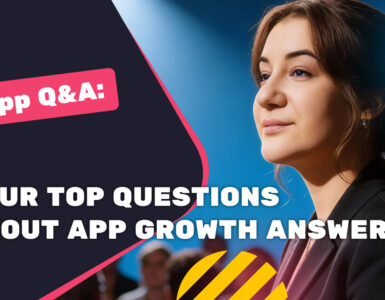Today we will talk about the mistakes the app developers may make and difficulties they may face before starting keywords promotion of their games.
As it is known, according to the statistics and some researches conducted by ASO agencies and services, almost 35% of the traffic the app gets from the search. The installs from the search are organic traffic, for which the app developers shouldn’t pay etc, as they do with traffic from Google Ads, Facebook Ads etc. But let’s be honest, when you, as an app developer, create a game, the most attention is paid to app graphics, features, fixing of bugs and crashes, and usually the attention to ASO and keywords particularly may be not paid at all. It may be much more easier to start ads to try to get the traffic and attract users from there, but it is needed to spend a lot of time trying to optimize the app.
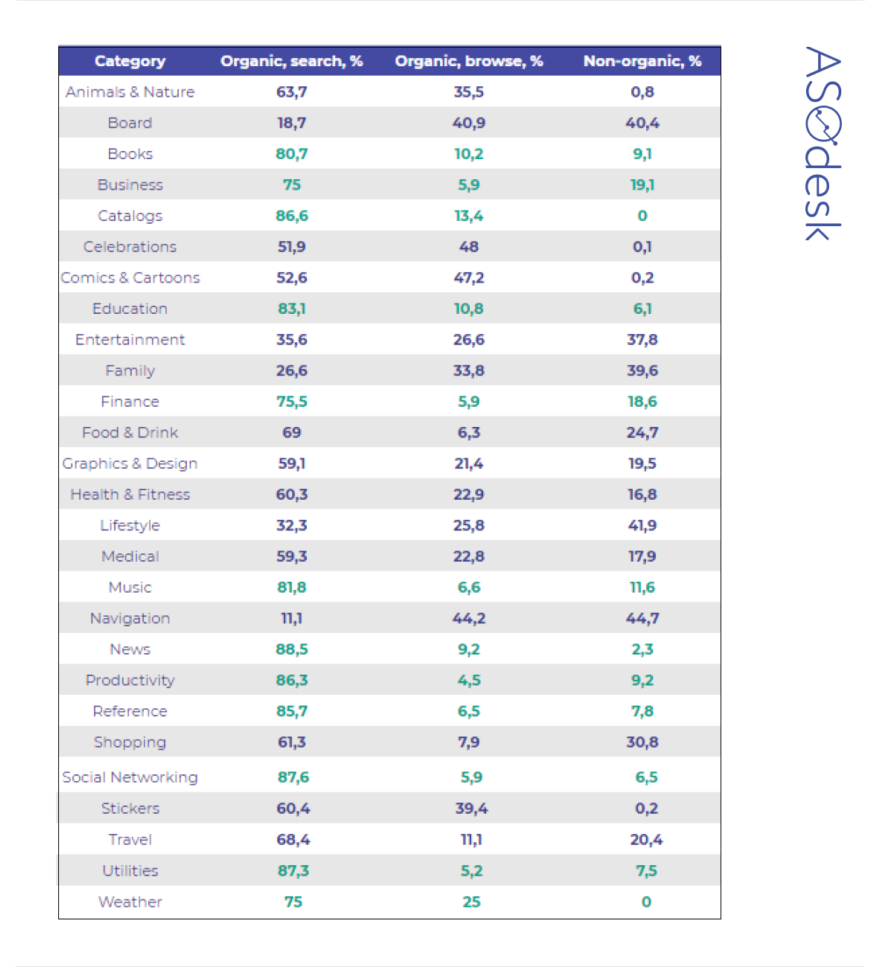
Information from https://ru.asodesk.com
And basically that is the 1st mistake the app developer may make. It is not paying attention to App Store Optimization.
Let’s quicky discuss what is ASO at all. App Store Optimization is the process of improving app visibility within the app stores and increasing app conversion rates. Basically, there are two sides of optimization, the work with app texts and visuals. Today we are mostly interested in app texts.
You may ask why you do need to create the texts, spend a lot of time writing the app description, title etc, as it is possible just to add few sentences which give the user the understanding what the app is about. Everything is pretty easy. You need to optimize the game so your potential users could find it on the store and download. If to talk about the text optimization, it includes the keywords research, title, subtitle for Apple, short description for Google, and long description for both stores.
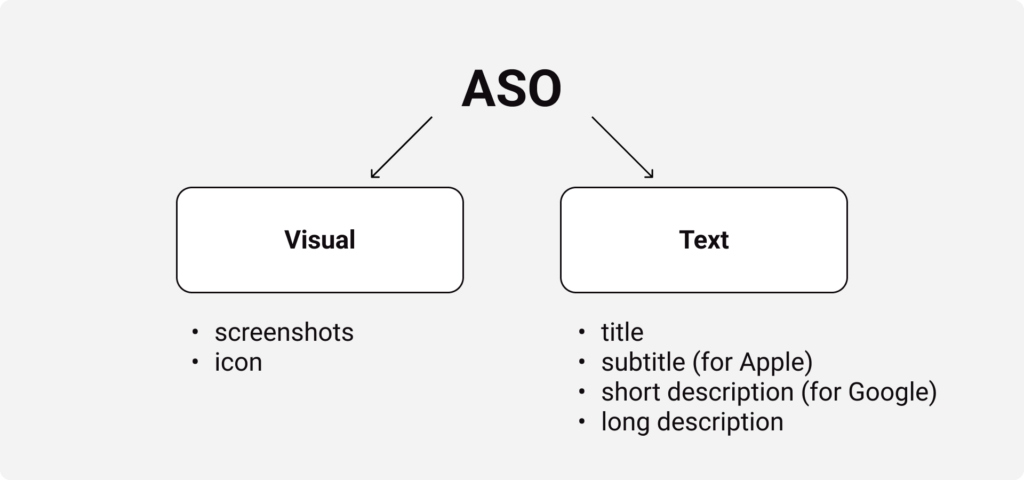
The way the stores algorithms are working pays attention to these fields, analyse them and decide if the app should be found on the store for different search requests users type into the search bar on GP or AP. So let’s imagine that you have developed cool tycoon game with great features inside. Of course, the aim for you is to overcome the other tycoon apps and get users. But the only thing you have written in app description is a couple of sentences which say that your app is cool and has great features. In such a way, most probably your app will be never found with search request (or keyword) “tycoon” by any user on the store. That’s easy, you need to add keyword “tycoon” to the app texts, so make Google or Apple algorithm understand that the app is connected with this search request.
The second mistake is not to work with keywords and not to create the keywords research on a permanent basis.
Basically, the keywords research is the first step you, as app developer, must do before creating the texts and proceed with App Store Optimization. Keyword research is not only about gathering all the requests associated with your app to one file, it is about the analysis. Usually it may take up to 5-6 hours to gather 150-200 keywords for the app in one region and just 2-3 hours to create all the texts. While gathering the keywords for your game you should focus on the next steps:
- think how organic users can find your app, do this from the side of this users. Imagine, that you would like to find exactly your game on Google Play and which request you would type in the search bar.
- make a brain storm with a team the same way you look for the keywords by yourself
- analyse your competitors, check their texts, try to figure out the keywords they have used
- use ASO services. Of course, it may seem that there are no advantages to use them while working with game, but believe me, this will make the keyword research process much more easier, faster and efficient
- check the keyword popularity before adding them to the texts. Of course, there is no official data from Google Play showing the actual keyword popularity, but ASO services could help. I do not mean that they provide 100% accurate popularity, but anyway this will help you to analyse the keywords. As for Apple, they provide the popularity with Apple Search Ads, and most ASO platforms give this data. This make the choice of keywords for texts much easier, as the higher the popularity, the more users look for this keyword on the store, the more organic users it may bring for your app.
In our blog we have a big article which can surely help you to find the keywords for your app and create a keyword research.
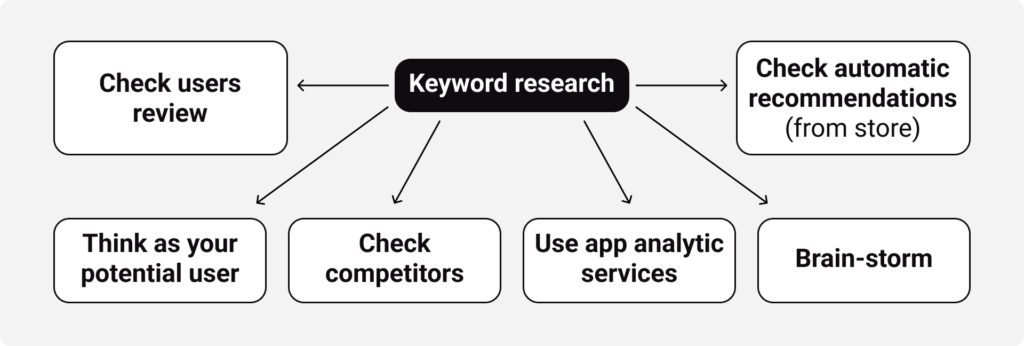
The third mistake is that you try to focus only on brand keywords and want to add them to texts (what is actually forbidden) or to promote the app for these keywords.
To tell the truth, to promote the app for brand keywords is, firstly, expensive, secondly, it may give no effect. Let’s imagine, that you want to find “subway surfers” game and basically you would usually type this keyword in the search bar at Google Play or AppStore. Of course, the first position will be occupied by the original game, but the list of apps on both stores consists of 250 apps, so for sure there will be other similar apps in the list. But here the question is if real organic users will download the apps which are lower in the list, go after the original game and occupy the positions from top 2. Probably, we can make a suggestion that such a possibility exists and some users have already played Subway Surfers and want to try some other similar games. But anyway, we cannot predict if this happens or not, although we shouldn’t deny that. So basically, focusing only on brand keywords in keyword research and in promotion itself may lead you to a dead end as a result. From one side, approximately 70-80% of the traffic for brand keyword is received by official brand app. From other side, even if you have the similar app and it is real cool, most probably that the app will never occupy top 1, where most part of traffic is, as I said before. The third issue is that even if you try to promote such a keyword, this may take a lot of time and spendings as well as it will be difficult to keep the positions because of the competitiveness.
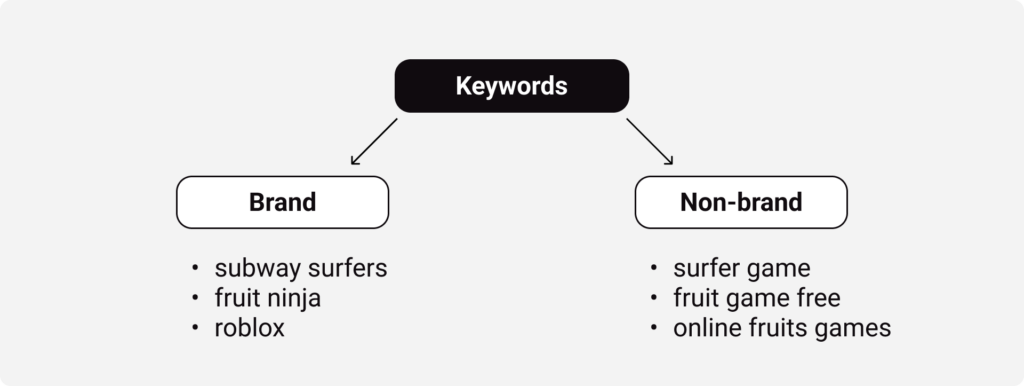
You may ask what I will offer in such a case, what keywords to focus on? You can still focus on high-frequency, popular keywords, but if we are talking about other brand-related games, it is still better to focus on some general keywords. Also do not forget, that low- and medium-frequency keywords are not always bad for promotion. Of course, you would like your game to occupy top positions mostly for popular keywords, but anyway it is still possible to get the traffic boosting less competitive keywords to top positions. That is one of the most important rules: do not try to focus on competitive keywords only, try to mix and promote the app for different search requests. The promotion of less popular keywords is usually easier, so logically it will cost not so much as less amount of installs and period of time are needed.
The fourth mistake consists in believing that game metrics do not influence the positions for search requests and the success of promotion in general.
To be honest, this is mostly connected with Google. As we noticed, Apple algorithm is quite straight and even the app with low conversions rates etc may reach top 1 for popular keywords using only keyword installs. But the situation is completely different. App metrics are so important if we are talking about keywords promotion on Google Play. Let’s imagine, that you have chosen the keyword, the service for promotion and are ready to start the first campaign to test. The service support or account manager has helped to create the strategy and we are waiting for positive increase together. Although, the campaign is ended, week after installs delivery passed, but no changes in positions at all. And, of course, the 1st thought is that the service doesn’t work and keywords promotion cannot bring any profit for your game. But then manager starts to ask about in-app activity, crushes inside etc. And basically that is so logical question if we see that the promotion hasn’t given the result. Before starting the keywords promotion, you should make sure that there are no crashes and app has in-app activity (btw, that’s why it is effective to mix Google Ads, for example, and keyword promotion and proceed simultaneously). In most cases, Google won’t let the app to increase in positions if it sees the negative dynamic.
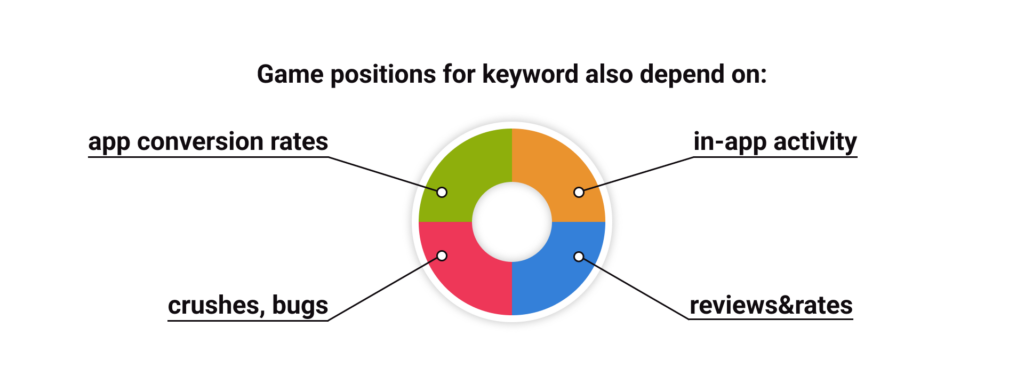
The fifth and the last mistake basically has the same logic as the previous one. It is connected with app reputation and how much users are satisfied with the product you provide.
To be honest, a lot of us may think that reviews and rates do not influence the process of keyword promotion. That is not so at all. In this cases, the algorithm works the same way as with in-app activity. Store analyses the general rating and reviews the app has and makes the decision is the game may get the increase in positions. Of course, the game may increase in rank for request even if the app rating is 3, but anyway, it is much more easier to boost the app with rating 4.5. Usually, the positions of apps with high rating increase faster as well. So before starting the keyword promotion, make sure that your game has a good rating in this country as well as reviews.
According to our experience, not working with reviews, for example, in general may be crucial for an app. A lot may think that no one reads the reviews and attention is mostly paid to icon, screens, etc. But as to the statistics given by Apptentive, users say that the lower the star rating, the less likely they’d be to download the app.
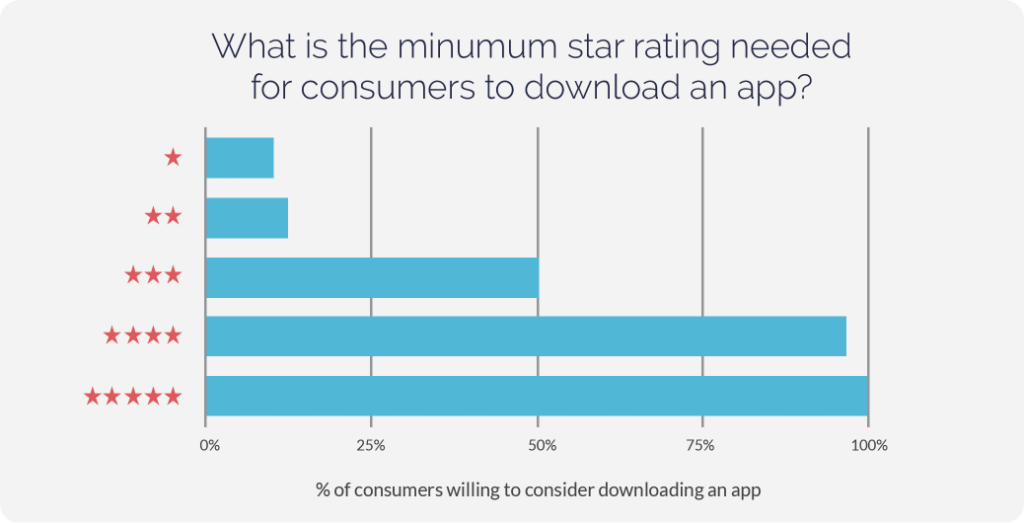
Statistics of users willingness to download the app depending on the rating
Information from https://www.apptentive.com
It is extremely important to work with the reviews and know at least basic principles which will help you to get more of positive feedbacks. The most wide spread mistake is when you, as app developer, do not answer the reviews or answer a few of them once in a month. You should answer all the reviews, both positive and negative. For positive reviews you may thank for the feedback, point that you appreciate this and will be happy if user continues playing the game. What to do with negative reviews? To thank as well and point that this feedback is appreciated by you. The replying to negative reviews in polite form will help you to develop the user loyalty. Finally, reviews and your replies are app reputation which should be worked out every day. To find out how to work with reviews follow the link and read our short guide about app reputation management.
If we have already started talking about mistaked, we believe that thinking that ASO optimization and keywords promotion have no influence on the app organic installs is a mistake as well. We won’t distinguish this as the 6th mistake in the list discussed previously, but let’s consider some examples of results your game may receive with keyword installs. We would like to show several screenshots showing the results of games promotion for search requests in different countries.
In the following example we have promoted Sudoku app in the most popular region, the USA. The keyword itself is quite competitive and has the medium score of popularity. As you may see on the graph, we have started the promotion from the 7th position and in 5 days we succeeded to achieve top 2. The total amount of installs used was about 1000. That is the example for Android application, so pay attention to the strategy we used (5 days, step by step increase)
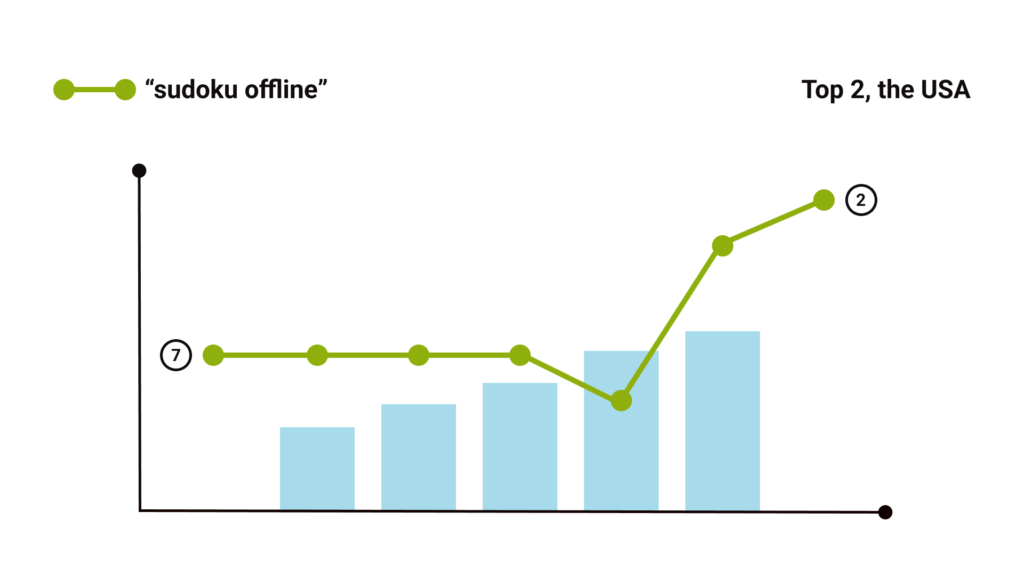
The second example shows the promotion of the Android app as well for the keyword “farm games” in the US. We have started the promotion from the position 39th and reached top 1 with 5 days campaign using in total 660 installs.
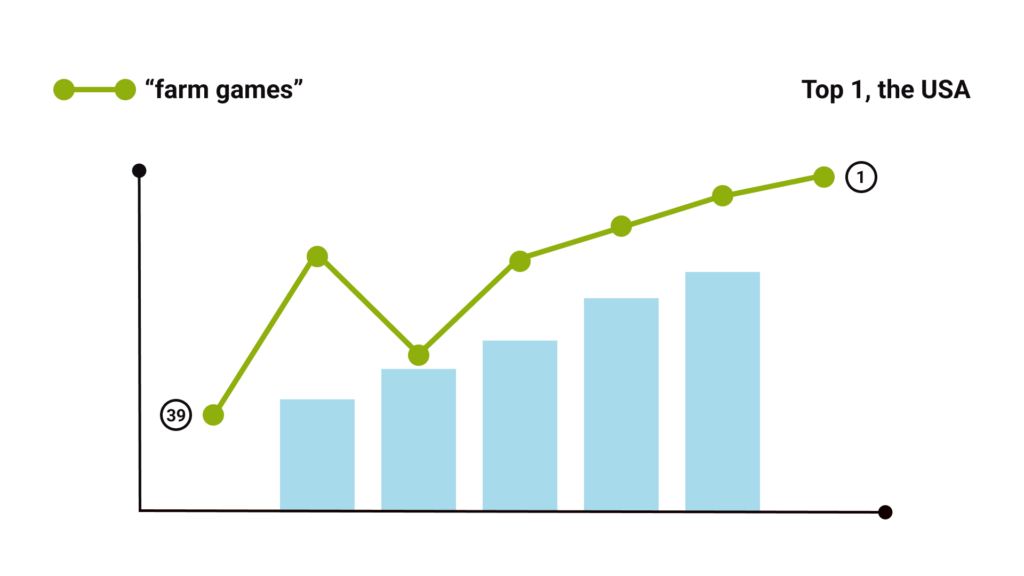
Finally let’s talk about the promotion on AppStore. The strategy itself differs a lot as for Appstore we usually use the lower amount of days in one campaign and the higher amount of installs daily. The keyword we worked with is “match 3 games”, the app was promoted in Great Britain and the total amount of installs used was 250 for 1 day. In such a way, we managed to increase the position from top 10 to top 2 with 1 day campaign.
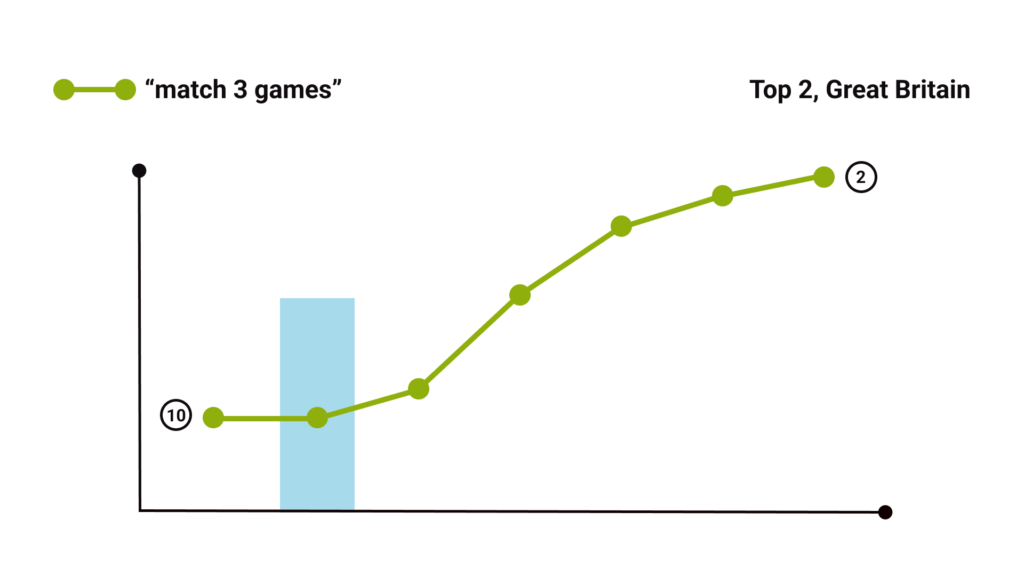
Basically, these examples show that keywords promotion can be successful and your game can reach top positions even in popular countries and for competitive keywords. The most important thing here is to choose the right strategy so to be sure that the rank will be achieved and you won’t just spend time and funds waiting for the results. Our team will be happy to help you with the strategy, tell all the secrets and share the detailed analyses of your game keywords so you could launch the new type of promotion for your app and get the maximum results.
These were 5 the most wide spread mistakes we usually face in our everyday work with games which are promoted by keywords. Try to avoid them and we wish everyone of you to occupy top positions for the most traffic keywords. If you have any questions, feel free to contact our support team or your personal manager.



